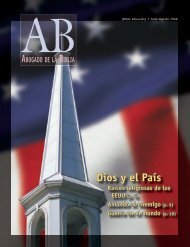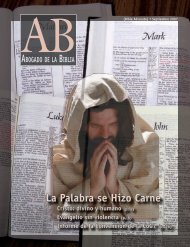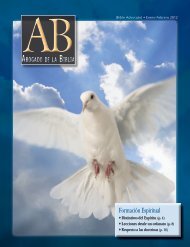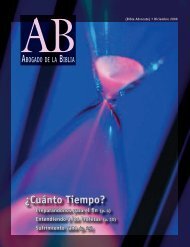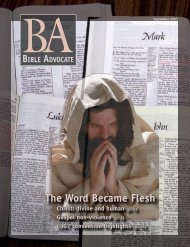English PDF - The Bible Advocate Online
English PDF - The Bible Advocate Online
English PDF - The Bible Advocate Online
Create successful ePaper yourself
Turn your PDF publications into a flip-book with our unique Google optimized e-Paper software.
Questions & Answers<br />
Reading<br />
your statements of faith, I<br />
am curious as to your position<br />
on Israel and Jewish people today. Another<br />
church says that Christians are “spiritual Israel”<br />
and have replaced the Jews in God’s overall plan.<br />
Where do you stand?<br />
Our<br />
viewpoint on this intriguing issue assigns<br />
more significance to modernday<br />
Israel than some do. Replacement theology,<br />
which you cited, teaches that Christians have fully<br />
replaced national Israel as recipients of biblical<br />
promises.<br />
On the other hand, we attach less modern significance<br />
to being Jewish than some others. Dispensationalists,<br />
for example, teach that God has<br />
two sets of people — the church and the Jews —<br />
with a different plan for each, present and future.<br />
We believe that, in the ultimate sense, God<br />
has only one “chosen people” — the church, His<br />
people in Christ (Eph. 1:4; 1 Peter 2:9). We resist<br />
the thought that the old covenant remains valid as<br />
God’s religious plan for Israel, or that anyone may<br />
be saved through the old covenant alone without<br />
the redemption that is in the death and resurrection<br />
of Jesus. Christians are, in a spiritual sense,<br />
the true Israel of God (Gal. 3:29; 6:16b).<br />
<strong>The</strong> truth of the previous paragraph, in our<br />
opinion, does not negate a continuing role for<br />
physical Israel. God is not yet finished with the<br />
Jewish people (Rom. 11:1, 2). Some of His promises<br />
through the prophets (Isa. 11:11, 12; Jer. 31:7-<br />
12; 32:37-44; Ezek. 37:21-28; 38:8-16; Amos<br />
9:11-15) and His words through Christ and Paul<br />
(Luke 21:20-24; Rom. 9, 10, and especially 11:25-<br />
29) speak to literal Israel’s role in the last days.<br />
It is unclear from Scripture just how the role of<br />
Israel will develop among the nations at the end of<br />
this age. We watch and pray for God’s final fulfillment.<br />
— Elder Calvin Burrell<br />
Do<br />
you allow women to serve on boards —<br />
as pastor, leader, elder, or deacon? Are<br />
there <strong>Bible</strong> verses for this?<br />
<strong>The</strong><br />
Church’s position is a moderate one:<br />
Women serve in various leadership<br />
positions, but not as elder or pastor. Many texts<br />
relate to this complex issue.<br />
We find the many <strong>Bible</strong> examples of women<br />
in lead roles: Miriam, a worship leader (Ex. 15:20,<br />
21); Deborah, a judge (Judges 4 and 5); Esther,<br />
a queen; Huldah, a prophetess (2 Kings 22:14;<br />
several more prophetesses in both testaments);<br />
Priscilla, a teacher (Acts 18:26); and Phoebe, a<br />
deaconess (Rom. 16:1, 2).<br />
We find general reports of women active in<br />
worship and other forms of service. In the New<br />
Testament, women were last at the cross, first at<br />
the empty tomb, first to evangelize Samaria, and<br />
first to convert in Europe. <strong>The</strong> Holy Spirit inspires<br />
both men and women to dream and prophesy for<br />
the Lord (Acts 2:16-18; 1 Cor. 11:5a).<br />
Leading women labored in the gospel with Paul<br />
(Phil. 4:2, 3), who cited several feminine names<br />
for recognition in Romans 16:1-16. Phoebe (v. 1)<br />
is called “deaconess” (RSV) — a female servantleader<br />
of the church. Deacon and servant translate<br />
from the same Greek word, diakonos.<br />
On the other hand, we also find Paul’s restrictions<br />
on women’s teaching and preaching (1 Cor.<br />
14:34; 1 Tim. 2:11-15). Reading these as firm<br />
church policy for all times and places can be problematic,<br />
since that would conflict with the examples<br />
and general statements reported above.<br />
In an effort to deal fairly with these diverse<br />
strands of truth, CoG7 encourages women to<br />
serve in a variety of congregational and denominational<br />
roles: teaching, music and worship leading,<br />
boards and committees, children and youth work,<br />
and many more — while the roles of elder and<br />
pastor are restricted to men.<br />
— Elder Calvin Burrell<br />
July-August 2011 • 7




